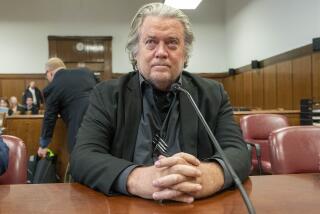Truth Panel, ‘Dr. Death’ Square Off
- Share via
CAPE TOWN, South Africa — In a frantic race against the clock, South Africa’s truth commission will square off today for the last time against one of the most sinister figures of the apartheid era, who is believed to know many of the former white regime’s darkest secrets.
Dr. Wouter Basson, who directed a military program said to have been aimed at eliminating black resistance with chemical and biological weapons, has stymied the main committee of the Truth and Reconciliation Commission for months in what is being portrayed by human rights activists as a powerful clash between good and evil.
On Wednesday and Thursday, compelled under court order, Basson appeared before the truth panel but steadfastly refused to answer questions, declining even to reveal his age.
But with the committee’s parliamentary mandate expiring at midnight tonight, Basson--nicknamed “Dr. Death” by the South African media--was warned Thursday to come clean today or face the prospect of going to jail for contempt.
“The fancy footwork and deception continues,” said Hanif Vally, the committee’s main inquisitor, who was unable to crack the stony-faced cardiologist. “Dr. Wouter Basson has been moving in those dark circles many years, and he is moving in them again.”
Commissioners told the physician to come prepared for a grueling day and night of questioning about Project Coast, the top-secret program that former government scientists say aimed to preserve apartheid--the past regime’s policy of racial segregation--by making blacks infertile, poisoning Nelson Mandela and other black leaders, and flooding black townships with highly addictive narcotics.
The committee heard spotty details of the program during hearings last month, during which Basson emerged as the project’s undisputed mastermind and the only one able to provide a sense of its entirety. But when Basson was called to testify, his lawyers went to court, arguing his testimony could prejudice his upcoming criminal trial on charges of conspiracy to commit murder, obstruction of justice, fraud and other alleged wrongdoing during his tenure with the military.
Basson lost the court battle on Monday, but has continued to thumb his nose at the committee. He showed up as ordered on Wednesday and Thursday but came without his regular bevy of lawyers. He then insisted that he could not cooperate any further without proper legal representation.
“Your conduct, Dr. Wouter Basson, has been very disrespectful of this commission,” Commissioner Dumisa Ntsebza, a human rights attorney who was imprisoned under apartheid, told Basson in a stern lecture.
Ntsebza ordered Basson to testify even without a lawyer, a ruling that was supported by an attorney representing the South African government at the hearing. But the heart surgeon--who is being protected by South African intelligence agents and whose legal bills are being picked up by the South African National Defense Force--was unmoved, his arms folded across his chest.
“In the light of legal advice, I cannot answer questions put to me without competent legal counsel to advise me,” he replied in the Afrikaans language. He later said he expected to have an attorney today.
As in the contentious case of former President Pieter W. Botha, who is facing contempt of court charges for refusing to cooperate with the same human rights committee, the tense standoff with Basson has far-reaching implications for the nearly concluded process.
Without Basson’s insights into the weapons program, analysts say, one of the most nefarious chapters in apartheid’s history may never be fully understood.
“The truth commission has not established the line of command and how this all operated,” said Louise Stack, an analyst for the Center for Policy Studies in Johannesburg. “To say P. W. Botha is the only person who can bear responsibility for this whole historical catastrophe is just not credible. It would be a great pity not to uncover the real mechanism of the whole thing.”
The Truth and Reconciliation Commission was established by Parliament in 1995 to delve into crimes of the apartheid era in the belief that revealing the truth would help heal wounds--and eventually nurture reconciliation among the country’s deeply divided races and political groups.
The commission’s mandate was to expire in April but was extended until the end of July because of the overwhelming workload. Commissioners will continue to work on a final report until October.
More to Read
Sign up for Essential California
The most important California stories and recommendations in your inbox every morning.
You may occasionally receive promotional content from the Los Angeles Times.











